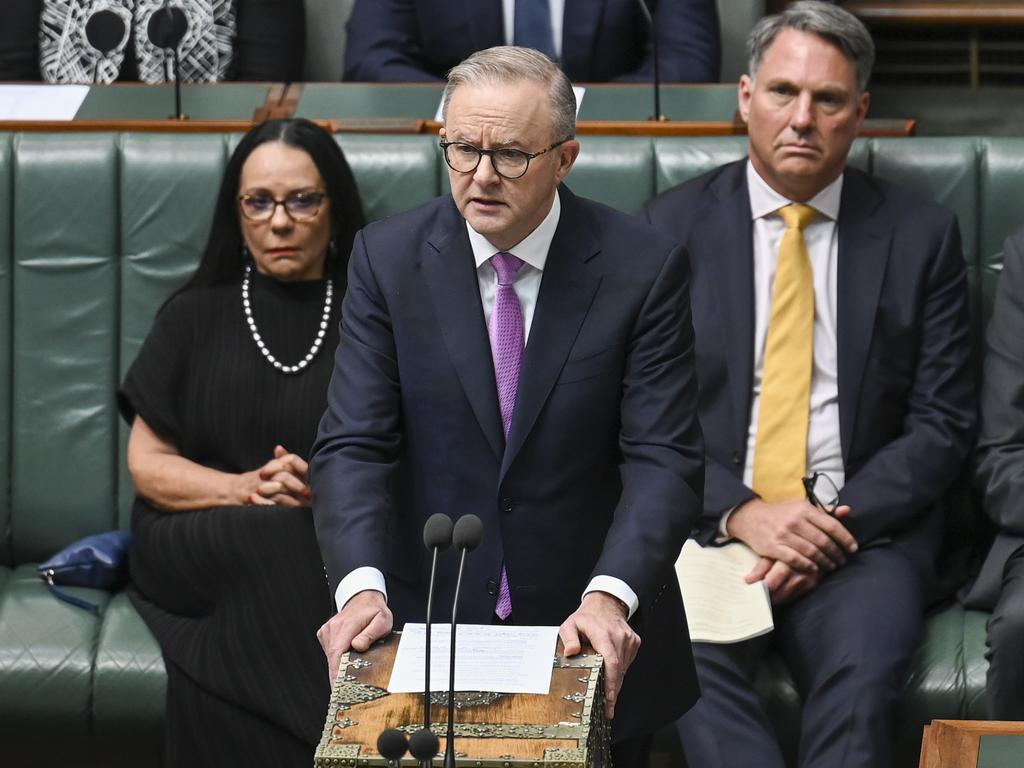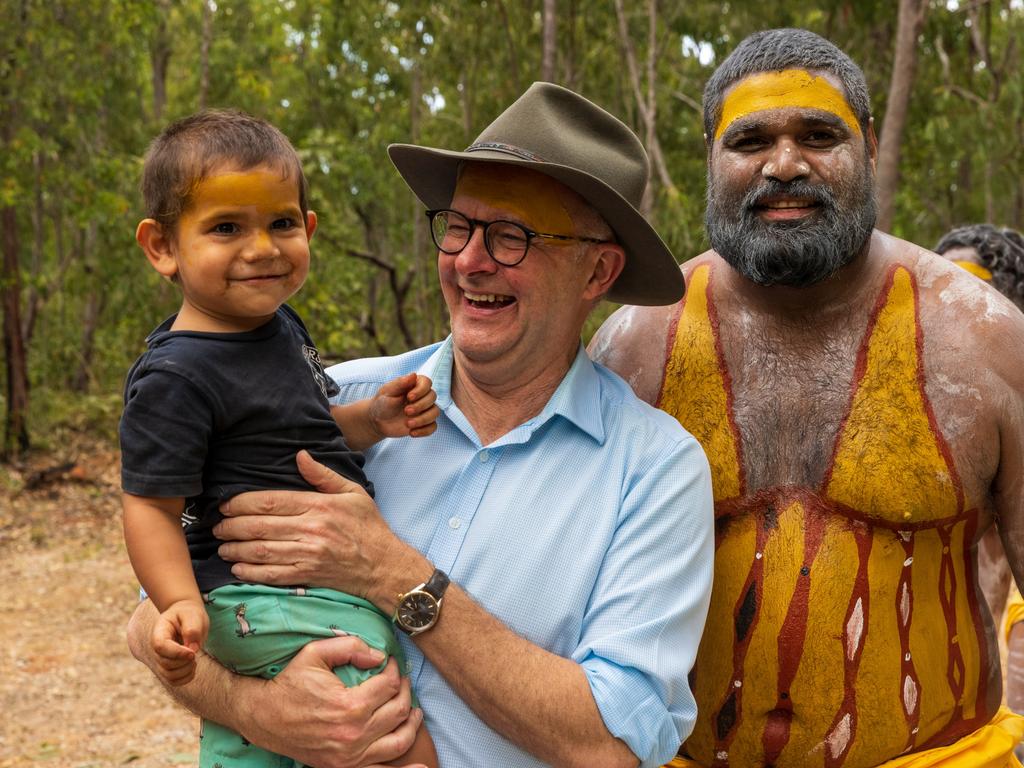‘A modest Indigenous voice to parliament? Take a look out west to consider its far reaching consequences’, writes Peta Credlin


In the clearest sign yet of what will come, all Australians need to look at the enormous Aboriginal heritage changes about to roll out across Western Australia from July 1. What’s more, these changes will create a whole new land-use approvals regime that circumvents elected officials and subjects the rights of private property owners to Aboriginal heritage assessment.
Especially since the May 2020 destruction of the cave at Juukan Gorge that had been a site of human habitation for more than 40,000 years, Western Australia has been grappling with how better to protect Aboriginal heritage without obstructing reasonable development.
The result is the Aboriginal Cultural Heritage Act, which will start to come into effect next month.
Many of the practices and procedures under this act are still being finalised, but it’s already clear that for most significant developments – instead of applying to local, state and possibly federal governments for approval – there will soon be an additional requirement to have approval from relevant Aboriginal bodies.
The act will establish, according to its memorandum, “a majority Aboriginal advisory body”, the Aboriginal Cultural Heritage Council, “to provide strategic oversight of the Aboriginal cultural heritage regime”.

This will include providing advice to the minister, designating local Aboriginal Cultural Heritage Services and approving cultural heritage permits and cultural heritage management plans.
On any property larger than 1100sq m (about the size of a large suburban block), at least in areas of designated cultural significance, for any significant construction activity there will need to be permits or management plans, depending on the nature of the activity and the nature of the cultural significance. Landholders will need to acquire these from (yet to be established) local Indigenous heritage services.
There are timelines set down for approvals, fees set for heritage assessors and processes for appeal if agreement can’t be reached. While the minister retains ultimate authority over land-use decisions (as was the case with the Juukan Gorge approval), there is a great deal of potential process (and cost) before anything would ever get to the minister’s desk.
The aim, says the memorandum, is to “recognise Aboriginal people’s special connection to country”; to recognise “the fundamental role of Aboriginal cultural heritage in the lives and wellbeing of Aboriginal people”; and to provide “for Aboriginal people themselves to determine what qualifies as Aboriginal cultural heritage and therefore is afforded protection under the legislation”.
The act, it says, provides “a broad definition of Aboriginal cultural heritage” to capture not only its “tangible” but also its “intangible” and its “living” elements.
Again, it’s reasonable enough to accept that there may be some elements of heritage that are merely spiritual and even that there can be new and evolving concepts of what heritage is. The issue, though, is going to be reconciling this with further economic development, especially as the act takes for granted a process of fee for service (from $150 to $450 an hour) in determining just what these might be, and negotiated financial settlements before development might take place with the administration of all this via myriad local Aboriginal elders.
A document produced last year by the big law firm Ashurst states: “Navigating the heritage landscape in project development in WA is going to get more complex over the next 12-24 months.”

The act, Ashurst says, “introduces a level of complexity and uncertainty that, in our opinion, renders key aspects … unworkable”.
In particular, Ashurst worries that the local Aboriginal cultural heritage services (that in many cases have yet to be set up or exist only in rudimentary form) will lack “the capacity to function efficiently”, hence creating “massive hurdles” (despite government funding of $77 million set aside for the new regime’s implementation).
As well, the law firm says, the obligation to use “best endeavours … in the context of commercial negotiations and bargaining … will likely be challenging”.
You can bet that will turn out to be a massive understatement.
West Australian farm groups are now mounting a last-minute fight against what the Pastoralists and Graziers Association says is “the biggest attack on private property rights since native title”.
According to the PGA, anything involving ground disturbance of more than 50mm (5cm) will require an individual permit from the local cultural heritage service. This would include “weed control with mechanical equipment”, “construction of new stock yards” and the “installation of new fences”.
A more extensive management plan will need to be approved, the PGA says, for “establishing a new farm … clearing land … contour cultivation … and new forestry plantations”. The PGA is worried that this could be a costly, open-ended process potentially taking months or even years. It says real heritage sites should be protected but not the ones suddenly discovered “just where someone wants to build a new farm road or set of stockyards”.
WA Farmers chief executive Trevor Whittington is particularly concerned at the potential for invented heritage claims to be settled at an unsustainable price. Also, the lack of transparency inherent in a system that turns on cultural heritage but where landowners may not be allowed to know what makes it culturally significant due to “cultural sensitivities”.

Indeed what amounts to cultural heritage can change across time, as the new act makes clear. Yet despite the extensive consultation and protection involved in the new act, because the minister retains ultimate authority, it still has been criticised in some quarters as a “failure to prevent cultural genocide” – suggesting those wanting to restore Aboriginal sovereignty, as if the past two centuries of settlement shouldn’t count, can never be satisfied.
How has it come to this? For one thing, there’s no effective opposition in the WA parliament. With only six Liberal and National MPs in a lower house of 59, not much is going to get effective scrutiny, even if there were a will to do so. For another, with only one metropolitan newspaper, what gets attention is very much the product of just one editor’s interests. At heart, though, this is what happens when unelected and unaccountable officials try to correct a whole system on account of one scandalous mistake (at Juukan Gorge) in ways conforming to current notions of identity politics and political correctness.
What is about to roll out in Western Australia is a micro example of the far-reaching Aboriginal controls that will come with the voice. If it’s established, given its reach into executive government, there’s little doubt that a new class of Indigenous officialdom would be created.
But as for the daily endeavours on which all our livelihoods depend, regardless of ancestry or cultural heritage, these will only get harder with a new and extra layer of Indigenous governance.
This is what happens when a government forgets Bob Hawke’s bicentenary declaration that in this country there must be no “hierarchy of descent” and “no privilege of origin”.







Anthony Albanese’s pitch to Australians for months has been that they should vote for his Indigenous voice to parliament because it will be an important “but modest change”. Only the cat is now out of the bag with his comments in a speech to Indigenous leaders this week declaring “let this be no modest change”.